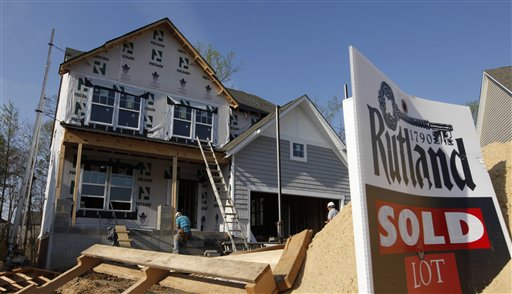WASHINGTON — Sales of U.S. new homes fell in February for the second straight month, a reminder that the depressed housing market remains weak despite some improvement.
The Commerce Department said today that new-home sales dropped 1.6 percent last month to a seasonally adjusted annual rate of 313,000 homes. Sales have fallen nearly 7 percent since December.
While a mild winter and three months of strong job growth have lifted re-sales, those conditions haven’t benefited the new-home market. The current pace is less than half the 700,000 that economists consider to be healthy.
There were some positive signs in the report. The government revised December’s sales figures up to show an annual rate of 336,000, the best sales pace in a year.
And the median sales price for new homes surged in February more than 8 percent, to $233,700. That’s the highest median price since June and could suggest builders are anticipating more sales in the months to come.
Still, economists caution that the housing market is a long way from fully recovering.
Though new-home sales represent less than 10 percent of the housing market, they have an outsize impact on the economy. Each home built creates an average of three jobs for a year and generates about $90,000 in tax revenue, according to the National Association of Home Builders.
Builders are growing more confident after seeing a growing number of people express interest in buying this year. They’ve responded by requesting the most permits to build single-family homes and apartments since October 2008.
Sales of previously occupied homes have risen more than 13 percent since July. And January and February made up the best winter for re-sales in five years, when the housing crisis began.
A key reason for the dismal sales in the new-home market is that builders must compete with foreclosures and short sales — when lenders accept less for a house than what is owed on the mortgage.
Foreclosure activity surged in February across half of U.S. states. The pace of foreclosures is increasing now that states have reached a settlement with the nation’s five biggest mortgage lenders over foreclosure abuses.
Builders have also stopped working on many projects because it’s been hard for them to get financing or to compete with cheaper resale homes. For many Americans, buying a home remains too big a risk more than four years after the housing bubble burst.
Send questions/comments to the editors.



Success. Please wait for the page to reload. If the page does not reload within 5 seconds, please refresh the page.
Enter your email and password to access comments.
Hi, to comment on stories you must . This profile is in addition to your subscription and website login.
Already have a commenting profile? .
Invalid username/password.
Please check your email to confirm and complete your registration.
Only subscribers are eligible to post comments. Please subscribe or login first for digital access. Here’s why.
Use the form below to reset your password. When you've submitted your account email, we will send an email with a reset code.